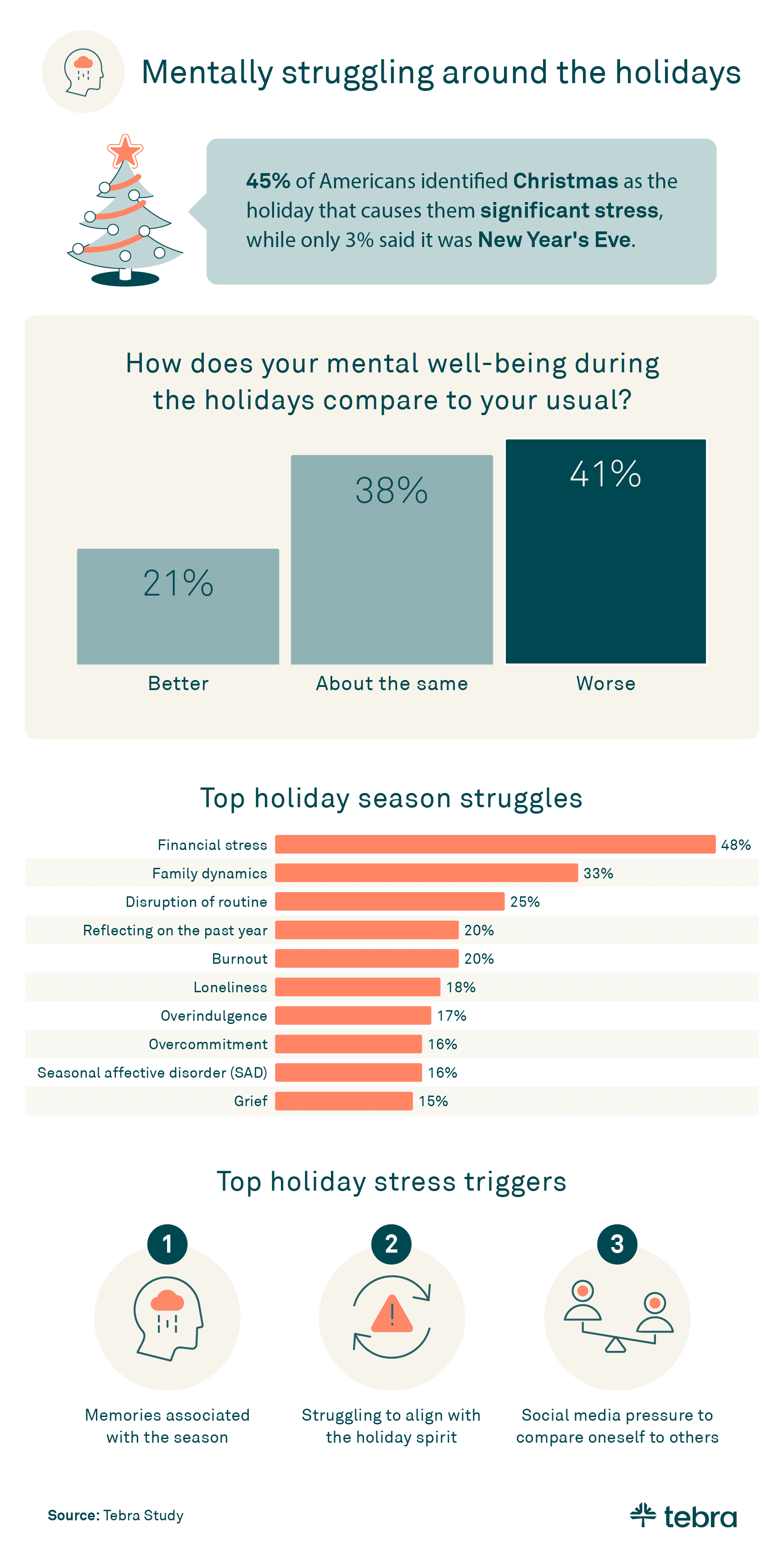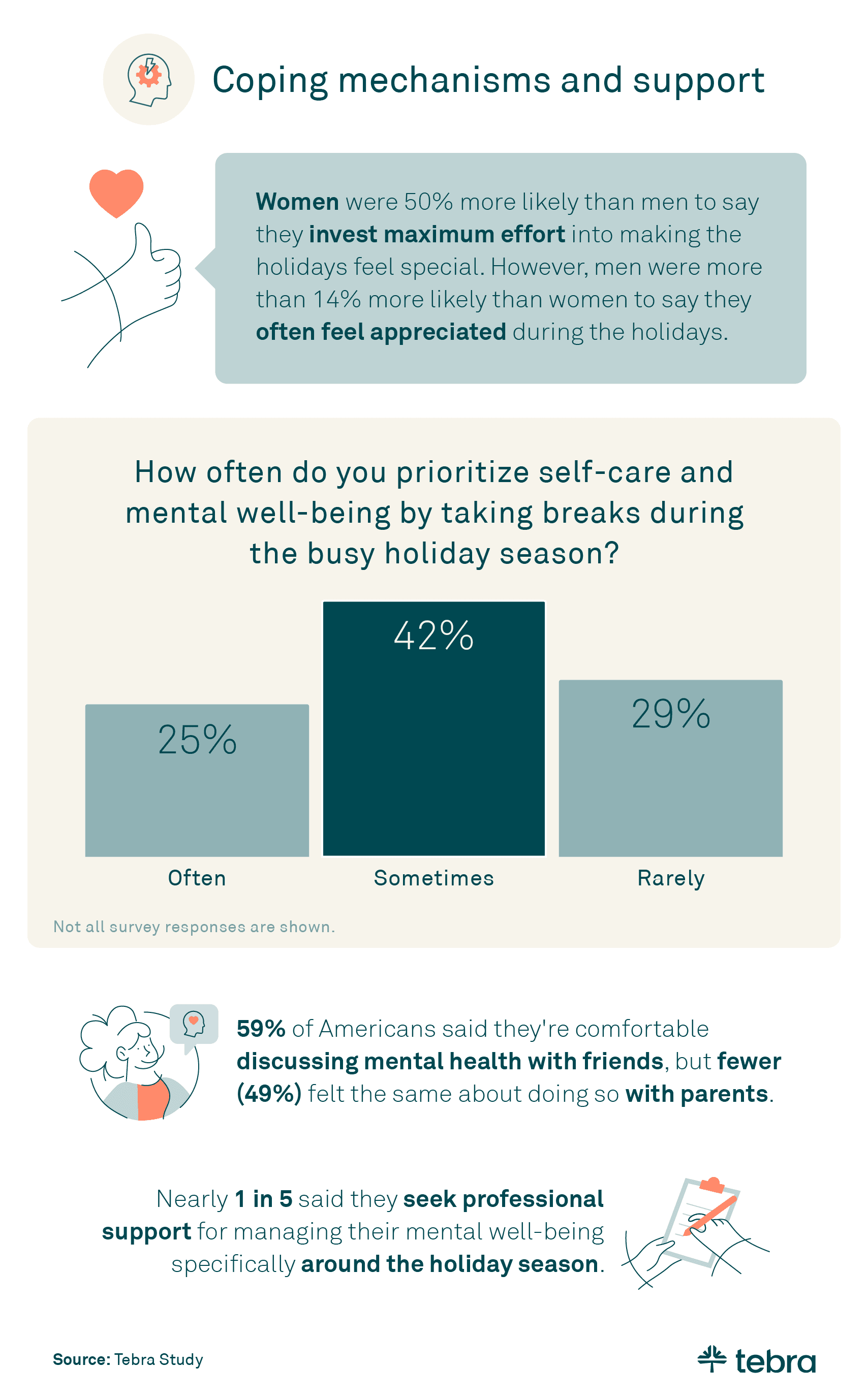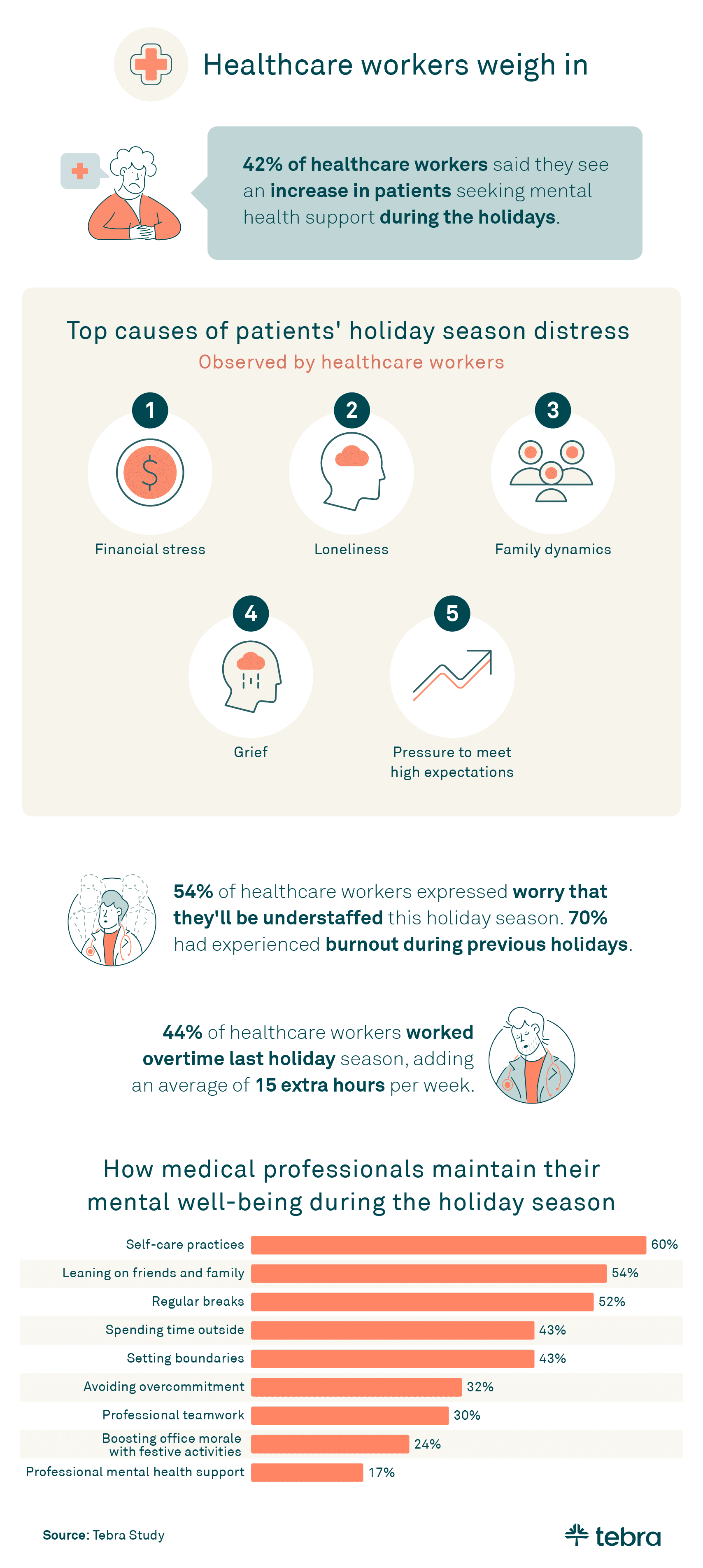Although the holiday season is typically synonymous with merriment and joy, it holds a more complex reality for many. Beyond the festive lights and family reunions, mental well-being can be challenging this time of year. To understand these hidden layers of the holiday experience, Tebra surveyed 1,000 Americans (including 150 healthcare workers) about mental health dynamics during this holiday season.
Why do some find this season more daunting than delightful, and what strategies do healthcare workers suggest to manage this heightened stress? Read on to find out.
Key takeaways
- Financial stress (48%), family dynamics (33%), and disruption of routine (25%) are the top struggles Americans who responded to the survey said they face during the holiday season.
- 41% of survey respondents say their mental well-being worsens during the holiday season.
- Nearly 1 in 5 seek professional support for managing their mental well-being, specifically around the holiday season.
- 42% of healthcare workers who responded to the survey have observed an increase in patients seeking mental health support during the holidays.
- 54% of healthcare workers are worried they’ll be understaffed this holiday season.
Unwrapping the emotional layers
Complex emotions and experiences emerge as we reach the end of the year. But what lies beneath the facade of festive decorations and family gatherings?

Typically a time for celebration, Christmas has been a significant stressor for 45% of our respondents. It far outweighed the stress associated with New Year’s, which only 3% found challenging. But in terms of holiday season well-being overall, 41% percent reported a decline in their mental health during this period. Some (21%) said they experienced an improvement. This indicates that the holidays are far from a one-size-fits-all narrative, showcasing diverse experiences.
When we asked what causes these challenges, financial pressures topped the list for 48% of people. Budgeting for the holidays — all the gifts, travel, and festivities — can be challenging. For 33%, family dynamics were a key holiday season stressor. Bringing the extended family together can stir up conflicts, straining otherwise happy gatherings.
A quarter of respondents (25%) cited disruption to their usual routines as their biggest struggle this time of year. This highlights how altered schedules, diets, and environments can contribute to stress.
Emotional triggers further complicate the picture, and 35% said the worst are memories of past holiday experiences. Many others (27%) shared that it is feeling out of sync with everyone else’s festive mood - this could make anyone feel isolated or misunderstood. Meanwhile, 26% have struggled most with comparing themselves to others, which can be exacerbated by social media posts about others’ happy holidays.
Striving for harmony
Who bears the brunt of holiday challenges, and how do they manage? Understanding how people cope and seek support might offer some helpful tips.

Our survey results showed that women typically put in more effort than men to create a special festive atmosphere. However, much like their overall emotional labor, their holiday efforts often go unnoticed. In contrast, the men we surveyed were 14% more likely to say they often feel appreciated for their contributions during the holidays.
The extra work required during the holidays makes self-care especially important this time of year. But our data speaks to a common struggle with this, with 29% of people rarely finding time to prioritize it and 42% only doing so occasionally. It seems that holiday festivities can overshadow the importance of personal well-being.
Sometimes, it helps to talk about our problems with a trusted friend or family member. But when it comes to discussing mental health, only 59% of Americans said they’re comfortable doing so with friends. That openness dropped to 49% when asked if they’d talk about mental health with a parent.
The emotional impacts of the holiday season extended to seeking professional help, with nearly 1 in 5 individuals saying they seek professional support for managing their mental well-being during this time. This underscores a need for accessible support during the fall and winter months.
Holiday healthcare insights
As the holiday season intensifies, healthcare workers find themselves at the crossroads of observing and experiencing its mental health impacts. What insights do these front-line professionals have to offer, and how do they navigate their well-being amidst the heightened demand for their services?

Healthcare workers have faced mental health crises in recent years, and we’ve found that the strain may be worse during the holidays. Of those we surveyed, 42% noted an increase in patients seeking mental health support during this time.
The primary causes of this distress mirror broader societal pressures: financial stress was the leading cause at 52%, followed closely by loneliness and family dynamics, each at 40%. Grief (21%) and the pressure to meet high expectations (20%) have also contributed to holiday stress. One mental health professional suggested this personalized coping strategy: “Learn what parts of the holidays work for you and your family, and let go of the other expectations.”
This seasonal impact is not just on patients; healthcare workers also face immense pressures. Over half of medical professionals surveyed (54%) said they worry about being understaffed during the upcoming holidays, and 70% have experienced burnout during previous holiday seasons. Their workload has been substantial, with 44% working overtime last season, averaging 15 hours per week over their usual time.
Another mental health professional offered this poignant reminder: “Self-care and setting boundaries with others is incredibly important to avoid compassion fatigue or burnout.”
How do these professionals manage their mental well-being amidst such high demand? The majority (60%) have relied on self-care practices. Others leaned on friends and family (54%), took regular breaks (52%), spent time outdoors (43%), or set boundaries (43%).
One surveyed professional advised, “Don’t feel obligated to attend family events if they are more stressful than exciting.” As festive events and indulgent spreads disrupt our usual schedules and diets, another wisely suggested, “Continue your normal routines for healthy well-being.” This might be easier said than done, but the results may be worth the effort.
A balanced approach to well-being
The holiday season, often seen as a time of joy, can pose significant mental health challenges for many Americans. Financial strain, family dynamics, and disrupted routines can affect everyone this time of year, but healthcare workers also face an uptick in mental health cases on top of their own stress. This underlines the need for self-care, personal boundaries, and empathy for everyone during the holidays — whether they’re healthcare professionals, patients, or otherwise.
Methodology
Our survey on holiday mental health impacts included 1,000 Americans. Of the 850 who were not healthcare workers, 54% were women, 45% were men, and 2% were non-binary; 20% were Baby Boomers, 30% were Gen X, 28% were Millennials, and 22% were Gen Z.
Of the 150 respondents who were healthcare workers, 75% were women, 23% were men, and 1% were non-binary. Their professional healthcare tenure was as follows: 32% worked in the industry for 5-10 years, 21% for 11-20 years, 6% for 21-30 years, 38% for less than 5 years, and 3% for more than 30 years. Their positions included (but were not limited to) administrative staff, nurses, mental health professionals, medical technicians, therapists (e.g., physical, occupational, speech), healthcare executives/managers, medical assistants, physicians, operational managers, and physician assistants. Their generational spread was 6% Baby Boomers, 16% Gen X, 58% Millennials, and 20% Gen Z.
Not all the above percentages total 100 due to rounding.
About Tebra
In 2021, with a combined mission to unlock better healthcare, Kareo and PatientPop joined forces to form Tebra — a complete practice automation solution for independent healthcare providers. With an all-in-one, purpose-built platform to drive practice success and modernize every step of the patient journey, Tebra provides digital tools and support to attract new patients, deliver modern care, get paid quickly, and operate efficiently. To learn more about how Tebra is committed to improving patients’ and providers’ success and well-being, visit www.tebra.com.
Fair use statement
If you find the insights from our article on mental health during the holiday season beneficial, feel free to share them for non-commercial purposes. We ask that you attribute the content appropriately by providing a link to this original page, thereby granting your audience full access to our in-depth research and detailed methodology.






